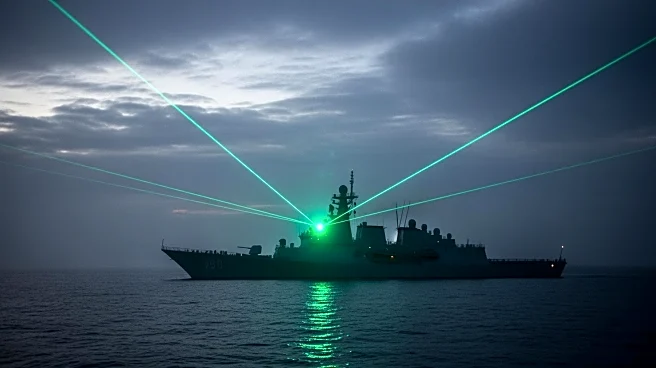What's Happening?
A Russian spy ship named Yantar has reportedly directed lasers at British forces, according to UK Defense Secretary John Healey. The incident occurred as the vessel entered UK waters for the second time
this year, following a previous deployment in January. The Yantar is known for its capabilities in gathering intelligence and mapping undersea cables, posing potential risks to undersea infrastructure. In response, the UK has deployed a Royal Navy frigate and Royal Air Force P8 planes to monitor the ship's activities. Healey emphasized the dangerous nature of the Yantar's actions, marking the first instance of lasers being directed at RAF pilots. The UK is prepared to take military action if the vessel changes course and travels further south.
Why It's Important?
The actions of the Russian spy ship Yantar highlight ongoing tensions between Russia and Western nations, particularly in the realm of intelligence and military operations. The deployment of lasers against UK forces represents a significant escalation, potentially threatening the security of critical undersea infrastructure. This incident underscores the need for vigilance and preparedness in safeguarding national security interests. The UK's response, including the deployment of military assets, reflects the seriousness with which it views the threat posed by the Yantar. The situation may influence future diplomatic and military strategies in dealing with Russian activities in international waters.
What's Next?
The UK government is closely monitoring the movements of the Yantar and is prepared to take further action if necessary. The situation may lead to increased diplomatic tensions between the UK and Russia, with potential implications for international relations. The UK may seek to strengthen its surveillance and defense capabilities to counter similar threats in the future. Additionally, there may be calls for international cooperation to address the risks posed by such vessels to global undersea infrastructure.
Beyond the Headlines
The incident raises broader questions about the use of advanced technology in military operations and the ethical implications of deploying such measures against foreign forces. It also highlights the strategic importance of undersea cables, which are vital for global communications and economic activities. The potential for sabotage or disruption of these cables could have far-reaching consequences for international connectivity and security.











